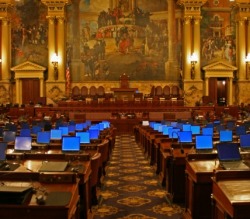Welcome...
What You Will Find Here...

This website outlines and provides all the necessary documents and information for a high school American Government or Civics teacher to carry out a simulation of the legislative process within the Pennsylvania General Assembly. This hands-on class activity is designed to take student learning to the next level, beyond the textbook and into engagement with a real-world issue. This state legislative simulation specifically focuses on the issues and legislation surrounding Marcellus Shale Natural Gas drilling, which is a significant environmental issue in Pennsylvania.
With the recent concerns over environmental, social, and economic impacts of natural gas drilling in the Marcellus Shale region of the state, this simulation will be a valuable tool to engage high school students in a hands-on learning activity.
Students will not only learn the legislative process of a bicameral legislature but also learn the significance of legislation to environmental issues and become engaged in a current and local matter. Students will develop an understanding of how state legislation can positively or negatively influence the quality of the environment, for instance, by mitigating environmental impacts or changing the level of environmental regulation.
With the recent concerns over environmental, social, and economic impacts of natural gas drilling in the Marcellus Shale region of the state, this simulation will be a valuable tool to engage high school students in a hands-on learning activity.
Students will not only learn the legislative process of a bicameral legislature but also learn the significance of legislation to environmental issues and become engaged in a current and local matter. Students will develop an understanding of how state legislation can positively or negatively influence the quality of the environment, for instance, by mitigating environmental impacts or changing the level of environmental regulation.
Learning By Doing...

Imagine you are a PA State Representative or a PA State Senator faced with the current issues related to Marcellus Shale natural gas drilling in the state. Would you support a severance tax on natural gas? Would you support the leasing of state forest land for natural gas drilling, in order to raise state revenue? How would you go about gathering support or opposition? In this legislative simulation of the PA General Assembly, students will try to reach a consensus on a bill that deals with such issues. They will ultimately try to pass a bill. Will they pass a severance tax? Or will they choose an alternative method of generating revenue, such as leasing state forest land? Will the Democratic majority in the House and Republican majority in the Senate agree? And how do the representatives' constituencies affect their decisions?
